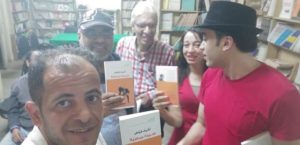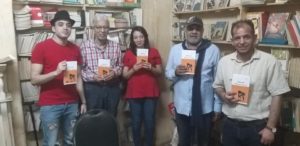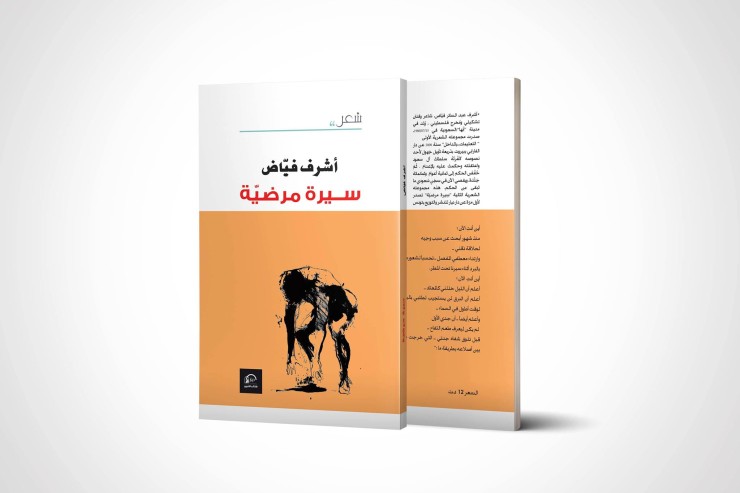Sīra maraḍiyya, Peeks out from behind Prison Bars

Ashraf Fayadh’s second poetry collection, “sīra maraḍiyya” (epicrisis) was launched in February 8, 2019, published by the Tunisian press Diyar Edition. The book was published thanks to efforts of a number of the poet’s friends who collected some unpublished poems and other writings from the years he has spent and continues to spend in prison. The two photos in the article refer to the reading in a bookstore in Cairo, Egypt, one of the first of an international effort that is being launched to promote the book and support for the jailed poet and artist. The author dedicates this 136 page collection, which includes 26 poems, to his “ulcer that accompanies him since birth” .
The book is like a window from which the poet peeks out into the world from behind bars, without screaming or complaining. Instead, with dignity, irony and bitterness he exposes darkness and injustice, celebrates universal values such as life and love, reflects upon his own actions and errors, remembers events from the past, uncovers the secrets of a difficult childhood. All of this in a poetic language that reveals great sensitivity, and is influenced by the fact that he is also a graphic artist with a gaze oriented towards modernity and its problems. Ashraf Fayadh’s style is unusual and clearly draws away from the tradition of Classicism and its canons while opening itself to new horizons and experiments. His writing is courageous, he does not hesitate to be daring and to renew himself, always seeking to go beyond what is possible without losing his sense of the poetic.

Through these poems, Ashraf Fayadh presents and describes a series of experiences alternating inside the human psyche, touching the most sensitive and sacred spheres. With great mastery of poetic tools and language, Fayadh demonstrates a deep knowledge of the human soul, which he is able to see, describe and unveil with greater freedom because of the detachment forced upon him by his captive status and uncomfortable position. He writes about love, motherland, the human soul with all their contradictions and complexities, describing the way people interact with their experiences and the situations they find themselves in.
Some lines describe a heart-rending longing for a lost love
Where are you now?
Boredom kills the taste of coffee …
The feverish city is not able to receive the night in a dignified way!
Where are you now?
I have been looking for months for a good reason to shave….
and wear my favorite coat … anticipating you may get cold as we walk under the rain..
Where are you now?
I know that, as usual, night has disappointed me…
I know that lightning will not respond to my request to last longer in the sky .
I also know that my first grandfather did not know the taste of the apple,
before tasting my grandmother’s lips… who somehow came out of his ribs.
In other poems he perceive the bitterness of the loss of his motherland, both physically and symbolically:
My country passed by here,
wearing the shoe of freedom….
Then off it went, leaving its shoe behind
In one of the poems the poet lays naked in front of himself and the reader, and reveals himself hiding nothing:
I am an animal …
naked… weak in structure, I walk on two legs..
I fall in love and exaggerate with hatred.
(…)
I hang on for dear life and my reasons are less convincing than those of the wolf
When both of us need to kill.
The collection ends with a poem written for his father’s death. There he describes the real feelings of someone who will forever be haunted by guilty feelings he cannot be freed from:
I couldn’t leave a good impression in our final meeting .
Then i surrendered to the guns of longing
pointed against me.
I refused to raise my hand
and so I became powerless.
Then pain tied me
he too incapable of forcing tears out of me.
Awareness gnaws at me from inside
and it kills any chance of survival.e.
Awareness kills me slowly
and it’s too late now to find a cure.
Courtesy of Sana Darghmouni, translated into English by Pina Piccolo.

Sana Darghmouni was born and educated in Morocco, and has earned her Ph.D. in Comparative Literature from the University of Bologna, where she had previously received her degree in Language and Foreign Literatures. She has taught Arabic at the University of Perugia and is currently teaching Arabic and Arab literature at the University of Bologna. She is one of the translators into Italian of Ashraf Fayadh’s poetry collection “Instructions Within”, and has written on Mahmoud Darwish, Khaled Khalifa, Hassan Najmi, Aicha Arnaout, and other Arab authors, whose work she has also translated into Italian. She has collaborated on the revision and the expansion of the Italian-Arabic compact dictionary edited by E. Baldissera to be published by Zanichelli, and is currently writing a two volume textbook of Arabic grammar. She is one of the founding members of La Macchina Sognante and is currently one of its editors.





















































